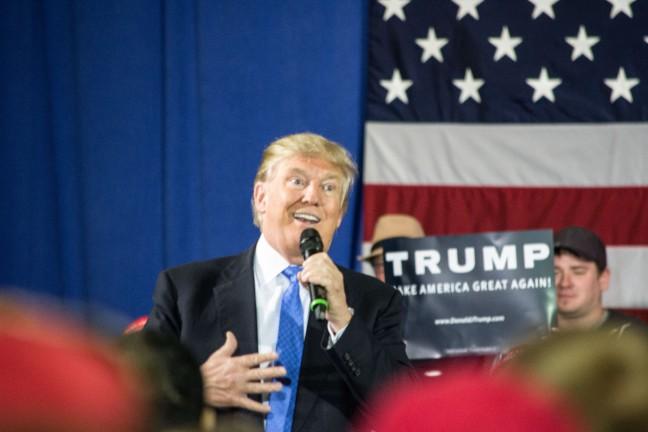President Donald Trump has a generational problem. A January poll asked Republicans if they’d like to see him get challenged for the Republican presidential nomination in 2020. While older Republicans do not want a battle, younger Republicans were ecstatic for one. The numbers were 82 percent in favor and 18 percent opposed among Republicans in the 18 to 24 age group.
On the policy side, Trump’s tax cuts are a great way to create more economic growth. His appointment of Neil Gorsuch to take the late Antonin Scalia’s seat on the Supreme Court was a wise choice that will ensure the presence of conservative thought in the Supreme Court for years to come.
Simultaneously, Trump’s tariffs are counterproductive and are leading to an unnecessary trade war that will damage the American economy. There’s not much to like about his character, nor his rhetorical style. Both are weighing him and other Republicans down in the approaching midterms.
Enter the possibility of a primary challenge. There are many young Republicans who want to see it happen. But could it be successful? Who would the challenger be?
With Paul Ryan announcing retirement, Democrats and Republicans gauge potential of ‘blue wave’
Ohio Gov. John Kasich made the most news about challenging Trump. He certainly has the experience, being active in state and national politics. He remains popular in his home state, with an approval rating of 52 percent and a disapproval rating of 30 percent. In Congress, he was instrumental in balancing the federal budget in the late 1990s.
Kasich is also very flawed, though. There are some things about the Ohio governor that are conservative, but also some things that aren’t. When he first became governor in 2011, Kasich decided to take Obamacare funds for Ohio’s Medicaid program. The federal money covers the addition of able-bodied, working-age, childless adults on the rolls. Kasich’s decision to expand Medicaid vastly increased the number of recipients, from 2.2 million when he first became governor to 3.1 million today. Spending snowballed from $18.9 billion in 2013 to $25.7 billion in 2017 — an increase of 35 percent.
Kasich knew his political legacy was at risk when Republicans took back the White House and maintained their control of Congress in 2016. That’s when he decided to start criticizing Republicans during efforts to repeal and replace Obamacare. Kasich may be admired in Ohio for his centrist politics, but that won’t work well if he wants to challenge Trump for the Republican nomination — especially with young ideological voters.
Kasich alienating political science majors in Madison not his best move
At this stage, it’s questionable if Kasich will even be a Republican in 2020. There has been some news about him running with a Democrat, Gov. John Hickenlooper of Colorado, on an independent ticket as the moderate alternative to two candidates cemented in ideology.
Aside from Kasich, there hasn’t been much noise about anyone wanting to challenge Trump. Businessman Mark Cuban has been talking about running in the primaries. Famous for his role on the ABC television series “Shark Tank” and his ownership of the Dallas Mavericks, he could run an effective campaign if he finances it generously. Cuban might be an unwise choice though because he is too similar to Trump. He had his own share of business controversies and he lacks a political record.
If anyone does run against Trump, it isn’t going to be easy. He’s a sitting president and many voters will feel a sense of loyalty towards him. The same thing happened in the 1976 presidential election. Sensing an opportunity, former Gov. Ronald Reagan of California decided to take on Republican incumbent Gerald Ford for the nomination. Reagan won many primaries thanks to his charismatic criticisms of big government combined with the fallout of the Watergate scandal and a weak economy. But even in this political climate, he lost.
There are two things that have to happen if reluctant Trump supporters and the Never Trump faction within the Republican Party want to be successful.
The first has to be unification. Those who want Trump to lose the nomination aren’t ideologically monolithic. There’s going to be the traditional Reaganite conservatives, but there will also be the Rand Paul libertarians and the John Kasich moderates. If Trump does have an opponent, then all these factions will have put aside their differences and help that candidate win.
The second is that there will need to be some kind of crisis to make dumping Trump compelling. When Reagan ran against Ford, the U.S. was suffering from stagflation. Reagan argued Ford’s solutions were not conservative enough to fix the economic problems and there were many Republicans who agreed. Ultimately, Reagan fell just short at the convention, with 1,070 delegates to Ford’s 1,187 — a defeat, but he came close.
A campaign against Trump does have potential, but it needs those two factors to have a chance at success. The 2020 presidential election is a long ways away and a lot will change from now until then. What happens will determine whether or not a “dump Trump” movement stands a chance.
John Graber ([email protected]) is a senior majoring in history and political science














